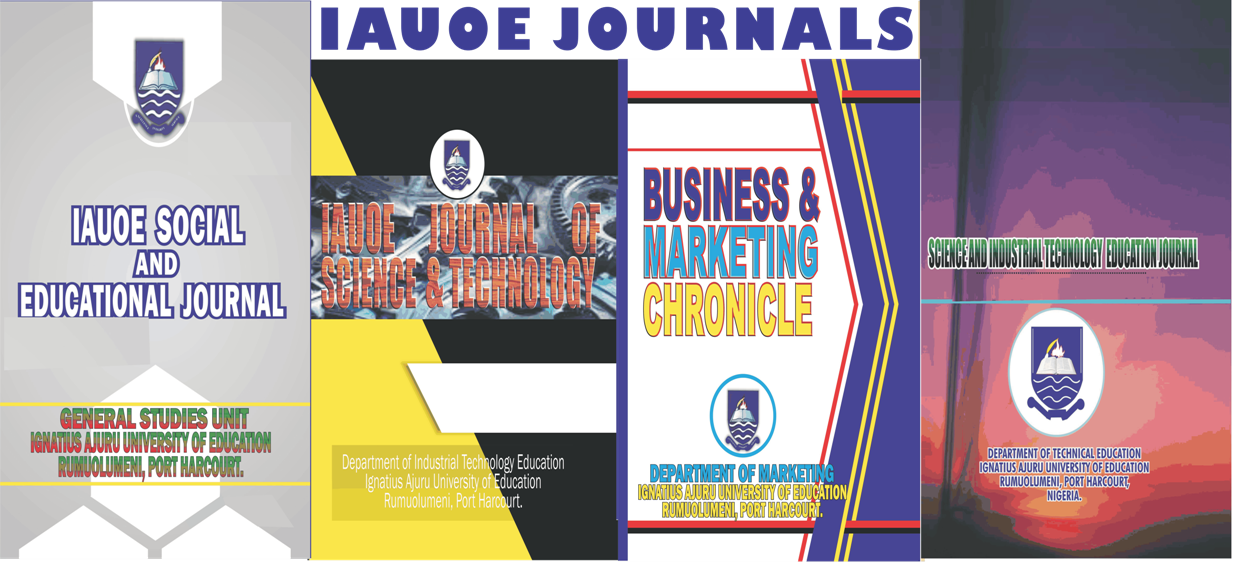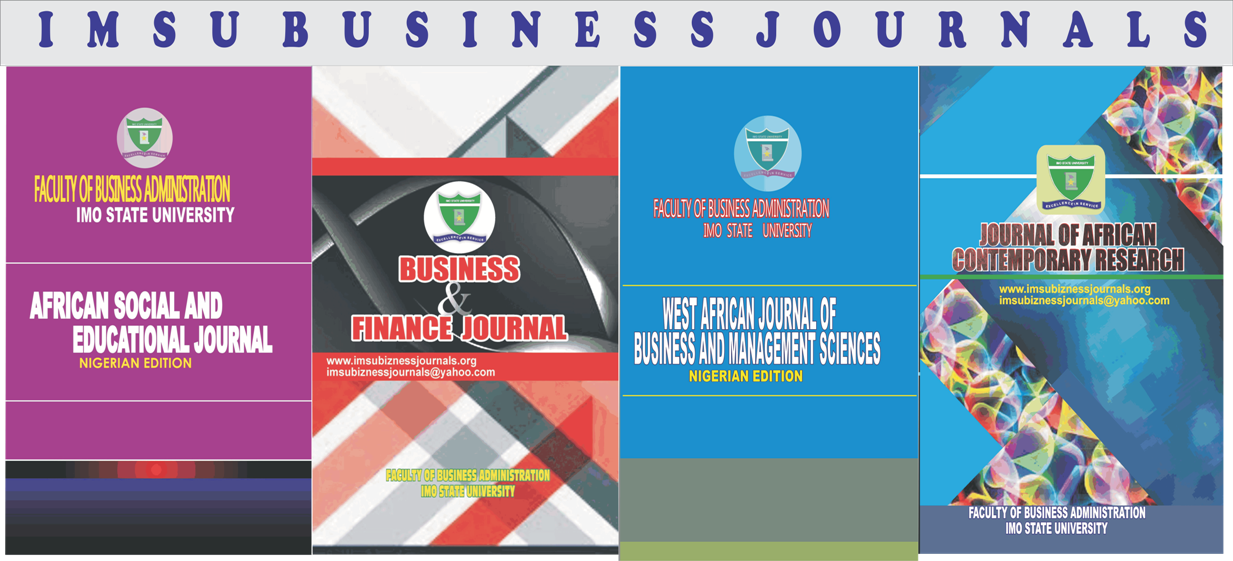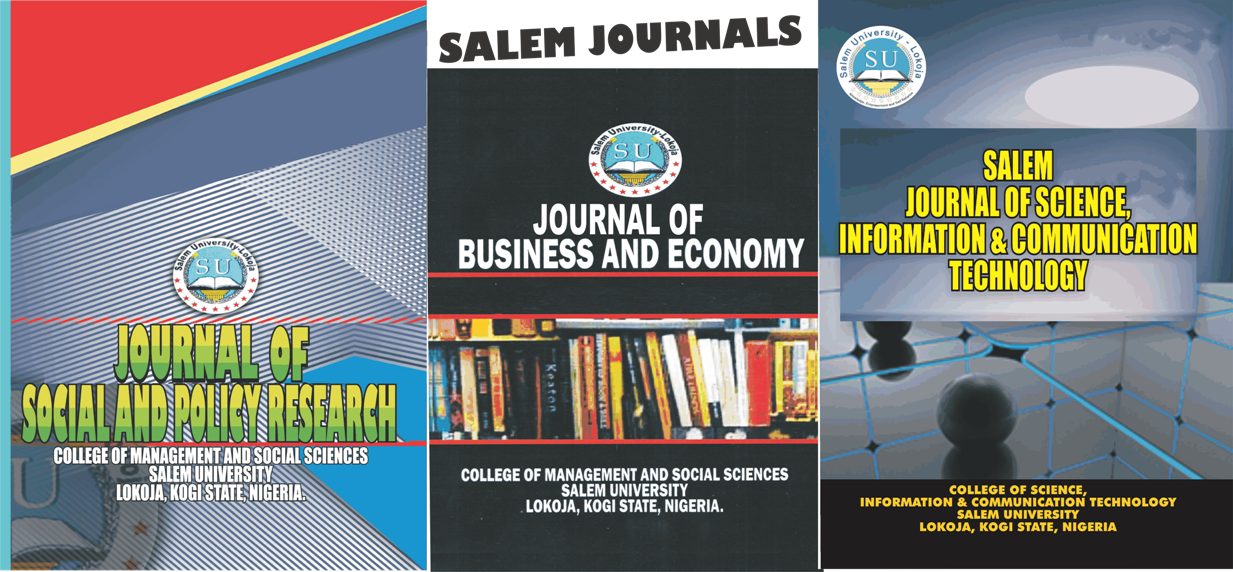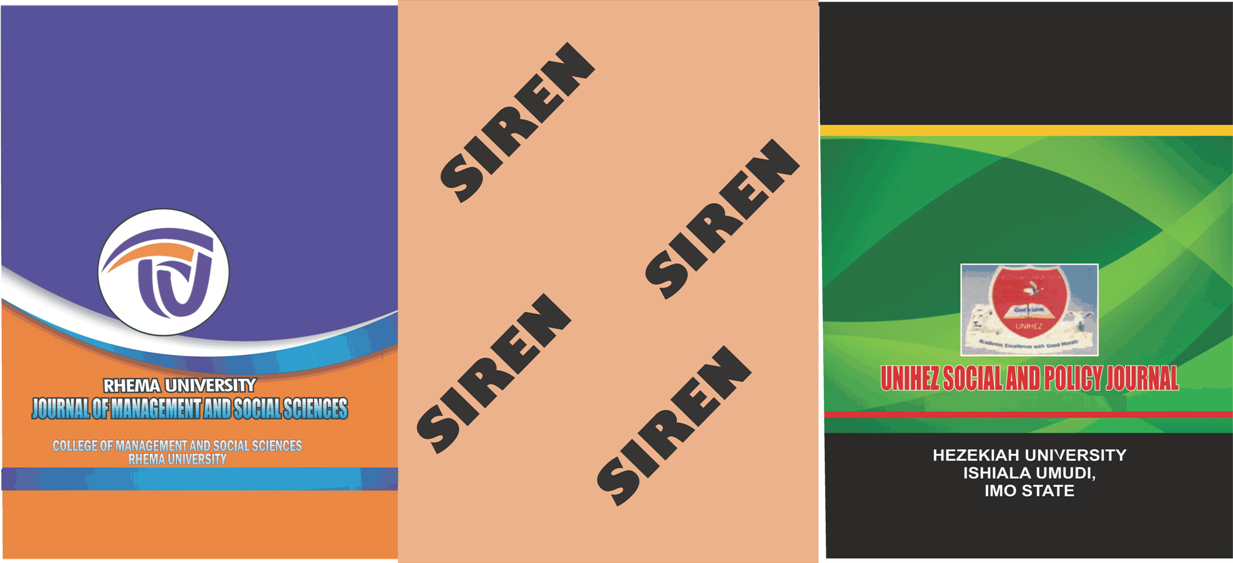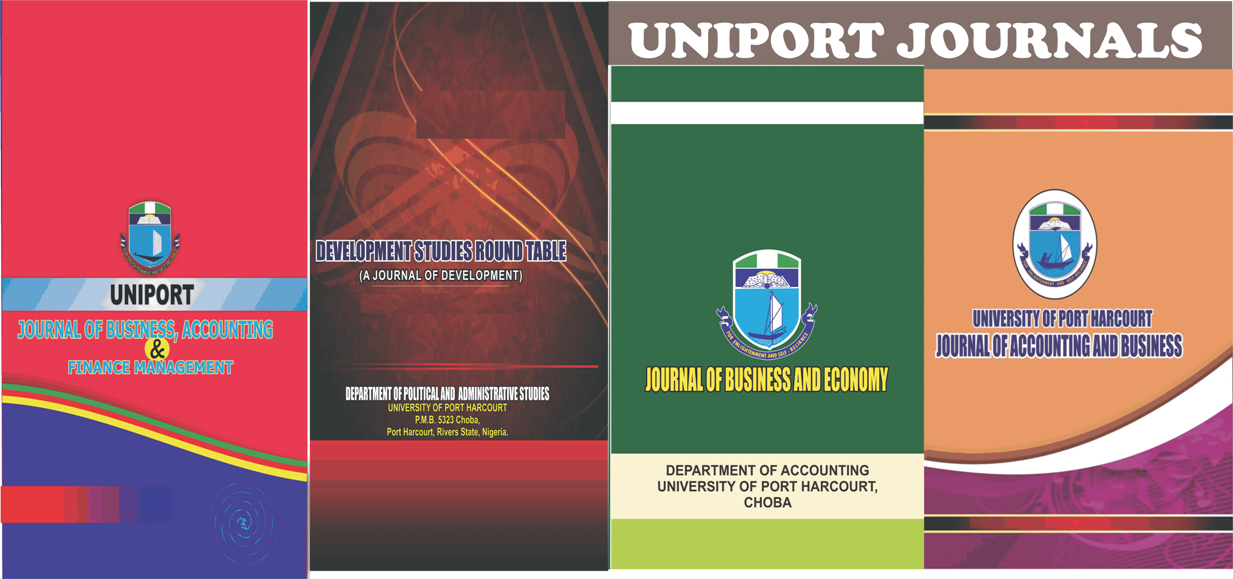AFRICAN JOURNAL OF ACCOUNTING, FINANCE AND MARKETING
ISSN NUMBER: 2805-4253| 1 | Title: FACTORS AFFECTING THE SUPPLY OF FINANCIAL INFORMATION Author: Owolabi, S.A. PhD. & Fakuade Oluwafunmilayo Sola Abstract: Abstract The study describes financial information as a tool used by the company to communicate the financial health and performance of the company to the shareholders and general public. The quality of the financial information depends on accounting quality standard, the institutional forces or factor that affects the demand and supply of the financial information. Efficiency, Synergy, Hubris, and Agency, Early behavioral, Stakeholder and Signaling theories were used to evaluate the supply of financial information and their significance. Forces affecting the supply of financial information includes; Debt and equity on Capital markets and Market for corporate control. The study concludes that firms which experience failure is not because they do not generate financial information but inappropriate utilization of the financial information generated in an organization and failure in the enforcement of financial information regulation aspects. The study recommends establishing a framework for structural changes which include financial information disclosure requirements and guidelines. ... more |
|
| 2 | Title: SOCIO-ECONOMIC INFRASTRUCTURE AND BUSINESS SUSTAINABILITY IN NIGERIA (EVIDENCE FROM ABEOKUTA SOUTH LOCAL GOVERNMENT AREA, OGUN STATE) Author: Ojeaga Paul I. Abstract: Abstract The study examines the impact of Socio-Economic infrastructure on business sustainability of SMEs in Abeokuta south local government area, Abeokuta, Ogun State, Nigeria. From the statistical result, it was found that there is a significant relationship between Socio-Economic infrastructure and business sustainability, with a confidence level of 99%. All three hypotheses tested were in support of this relationship. The result from the model summary table revealed that the extent to which the variance, Business growth can be explained by organizational training is 60.6% (R Square = 0.606). Revealed that the extent to which the variance, Business growth can be explained by organizational training is 60.6% (R Square = 0.606). Table 4.3.3 shows that the simple model that expresses the significant impact between organizational training and Business growth and also highly significant at 1% level. As a result. This study recommended that Governments should aim at improving infrastructure such as roads and telecommunication as well as power supply and water as a way of promoting the growth of SMEs. Government should seek ways to support SMEs and provide the needed infrastructures such as education to aid their survival and also SMEs should work on ways to attract government interest and attention. ... more |
|
| 3 | Title: ASSESSMENT OF FACTORS AFFECTING PERFORMANCE OF WOMEN ENTREPRENEURS IN NIGERIA Author: Nwokoro, Ngozi A. Abstract: Abstract For a country to achieve its development goals, women must be incorporated in the entrepreneurship activities. A lot of literature supports the role of women in economy building. This study sought to determine factors influencing the performance of women entrepreneurs in Lagos state. The study was guided by the following objectives: To investigate the influence of levels of education on performance of women entrepreneurs; to determine the influence of property ownership on performance of women entrepreneurs; to investigate the influence of competition from well-established enterprises on performance of women entrepreneurs and to assess the influence of domestic commitments on the performance of women entrepreneurs. A conceptual framework to show the relationship between the dependent variables and independent variables including all indicators was used in the study. The target population for this research included all the 12300 women entrepreneurs in Surulere, Ikorodu, Agege and Eti-Osa, with a sample size of 370 determined from Krejcie and Morgan table and randomly selected. A descriptive Research design was used to allow researcher to gather information, summarize, present and interpret data for the purpose of clarification. Stratified random sampling was used where each location formed strata. Proportional allocation was used to compute the exact number of subjects in each location which was a correct representation from the strata. The received data was classified, summarized, coded, sorted and SPSS and excel softwares used in analysis. From this study, it was observed that although there is the possibility of women entrepreneurs operating business enterprises in the same capacity and magnitude as men, traditional roles and practices such as domestic commitments, low levels of education, lack of property ownership and lack of opportunity driven motive to start enterprises continues to influence the performance of women entrepreneurs negatively in terms of monthly income sales, profit margin and types of business enterprise. ... more |
|
| 4 | Title: RISK-TAKING TENDENCY, INDIVIDUAL TRAITS AND ENTREPRENEURIAL INTENTION OF UNDERGRADUATE STUDENTS IN NIGERIA: A THEORETICAL APPROACH Author: Adeoye, Olumuyiwa Oluseun &Olubiyi, Timilehin Olasoji PhD. Abstract: Abstract Nigerian undergraduate students risk-taking tendencies, individual characteristics, and entrepreneurial intentions are explored in this research, which advances our knowledge of these phenomena. While there has long been discussion about their relationship, there has only been minimal empirical data addressed in developing nation contexts such as Nigeria. Entirely theoretical research was conducted in order to close the gap, with the majority of the data coming from a complete assessment of notable works of literature and policy documents. As a result of the findings, it can be concluded that there is a relationship between undergraduate students risk-taking tendencies and their entrepreneurial intentions. According to the findings, risk-taking tendencies play a significant role in the development of entrepreneurship among students in Nigeria, which is supported by the findings. As a result of this finding, the government should undertake more comprehensive and realistic initiatives to promote entrepreneurship among graduates ... more |
|
| 5 | Title: ANALYSIS OF NIGERA’S EXTERNAL DEBT PROFILE AND THE ECONOMY Author: Ewiwile, Stephen (PhD.) Abstract: Abstract The study examined the Nigeria’s external debt profiles on the economy. The trust was to ascertain the effects of exchange rate, interest rate and external reserves on gross domestic product (GDP).Secondary sources of data were collected from CBN statistical bulletin and World Bank indicator 1997-2021. Multiple regression tests were used for the analysis. Findings showed that the independent variables significantly affect Nigeria’s gross domestic product (GDP) except for real interest rate. It was recommended among others things that the government should borrow only to finance capital project as infrastructure and human capital development for enhance economic growth. ... more |
|
| 6 | Title: DOES CREDIT RISK MANAGEMENT AFFECET FINANCIAL PERFORMANCE OF BANK IN NIGERIA? Author: Ajagbe, Surajdeen Tunde, PhD., Ewansiha, Emmanuel Osaretin & Saidu, Sulaiman Abstract: Abstract The study examined the effect of credit risk management on the financial performance of Eco Bank Nigeria Plc for the period of 2011-2020. Secondary data were sourced from annual reports and financial statement of Eco Bank Nigeria Plc. The study employed ordinary least square regression technique in analyzing the data extracted; the analysis was done with the aid of E-View Econometric tool. The study revealed that loans and advances and loan loss provision have positive and insignificant effect on profitability, while non-performing loan has a negative and insignificant effect on profitability. The R-squared which measures the overall goodness of fit of the regression shows the value of 84.5%. While the Durbin Waston statistic with value of 2.808450 shows that there is relative auto correlation among the considered variables and the overall regression is statistically significant. Thus, the study concluded that sound credit management heightens financial performance and holds the financial strength of the bank. It was recommended that the bank should put in place sound credit management policies and Practice. Issue recoverable loan and advances and provide for loan losses for desired credit risk exposure and increased profitability. ... more |
|
| 7 | Title: EFFECT OF FINANCING MIX ON FINANCIAL PERFORMANCE OF QUOTED FIRMS IN NIGERIA Author: Ehiedu, Victor Chukwunweike & Adole, Abah Adole Abstract: Abstract The study examined the effect of financing mix on financial performance of quoted Firms in Nigeria, but specifically targeting the firms listed on the Oil and Gas sector in the Nigeria Stock Exchange for the period of 2011-2020 (10years). The specifics objectives of the study is to examine the effects of measures of financial mix, namely; EF, DF and DEF in relation to financial performance (proxy with ROE) of listed Oil and Gas firms in Nigeria. The ten (10) companies was selected for the study and data was collected through the secondary data collection method used, precisely the annual report of selected quoted companies in the Oil and Gas sector. Descriptive statistics, correlation matrix, panel unit root test and Pedronic cointegration test was employed and the multiple regression analysis of the (E-VIEW) at 0.05 level of significant (95% confidential interval was used. The findings revealed that DEF have significant effect on ROE while EF and DF does not have significant effect on ROE. The study concluded that financial mix does not utilize significance effect on financial performance of firms. Thereby recommends that firms should try to finance their investment activities with retained earnings and use debt as a last option as this is consistent with the pecking order theory. ... more |
|
| 8 | Title: ANALYSIS OF NIGERA’S EXTERNAL DEBT PROFILE AND THE ECONOMY Author: Ewiwile, Stephen (PhD.) Abstract: Abstract The study examined the Nigeria’s external debt profiles on the economy. The trust was to ascertain the effects of exchange rate, interest rate and external reserves on gross domestic product (GDP).Secondary sources of data were collected from CBN statistical bulletin and World Bank indicator 1997-2021. Multiple regression tests were used for the analysis. Findings showed that the independent variables significantly affect Nigeria’s gross domestic product (GDP) except for real interest rate. It was recommended among others things that the government should borrow only to finance capital project as infrastructure and human capital development for enhance economic growth. Keywords:External Debts, Reserves and related items, Lending interest Rate, Exchange Rate, Dependent, Gap, Economic Growth... more |
|
| 9 | Title: EFFECT OF FORENSIC ACCOUNTING AND INVESTIGATIVE TECHNIQUES ON WHITE COLLAR FRAUD IN THE NIGERIAN CIVIL SERVICE Author: Odogu, Terry Keme Zuode & Ayodele, Peter Oluwadamilola Abstract: Abstract This study is primarily aimed at determining if the application of forensic accounting and investigative techniques can detect and prevent white collar fraud in the Nigerian civil service. To achieve this, the study used Cochran Sample Size Determination Formula to administer 300 copies of questionnaire on auditors, accountants, staff of code of conduct bureau and bankers in the Nigerian civil service. Descriptive and inferential statistics (mean, standard deviation, correlation and multiple regressions) from SPSS 22 test outcome were employed to analyze the data collected. The result from the analysis revealed that the introduction of TSA and IPPIS have contributed immensely to detecting and preventing white collar fraud in the Nigerian civil service. This was evident from the significant p-value of 0.000 and a positive coefficient of 0.401 and 0.607 in respect of white-collar fraud against the independent variables namely TSA and IPPIS. Consequently, the study concluded that the implementation of TSA, and IPPIS have aided to a large extent in the detection and prevention of white-collar fraud in the Nigerian civil service. Based on the findings, it is recommended that TSA and IPPIS should be holistically, vigorously, transparently and impartially implemented at all tiers of government. ... more |
|
| 10 | Title: FORENSIC ACCOUNTING TOOLS AND QUALITY OF ECONOMIC AND FINANCIAL CRIMES INVESTIGATIONS IN NIGERIA Author: Owolabi, B. , Igbokwe, K. Geraldine, Owolabi, Oluwasikemi Janet & Alu, Chituru N.A Abstract: Abstract There has been an increase in the rate of economic and financial crimes in the country and this affects both the public and private sectors of the country. This study examined the effects of forensic accounting tools on the quality of economic and financial crimes investigation. This study adopted a survey research design with the Economic and Financial Crimes Commission in Nigeria (EFCC) For the purpose of this study, simple random sampling technique was employed and the sample size was fifty-two (52). Investigators and detective of the Economic and Financial Crimes Commission in Nigeria (EFCC). Data was obtained through the use of electronic questionnaires. The findings revealed that Forensic ToolKit significantly affects economic and financial crimes investigation quality (Adj.R2= 0.290, F(1,52)= 22.277, p=0.00); EnCase has a significant positive impact on economic and financial crimes investigation quality (Adj.R2= 0.447, F(1,52)= 43.019, p=0.00); fraud prevention, detection and deterrence skills have a significant impact on economic and financial crimes investigation quality (Adj.R2= 0.709 F(1,52)= 127.608, p=0.00); fraud audit, investigation and interviewing skills have a significant impact on economic and financial crimes investigation quality (Adj.R2= 0.625, F(1,52)=87.848, p=0.00); litigation, mediation and arbitration skills have a significant impact on economic and financial crimes investigation quality (Adj.R2= 0.736, F(1,52)=145.721, p=0.00); computer assisted reviews and document reviews have a significant impact on economic and financial crimes investigation quality (Adj.R2= 0.610, F(1,52)=82.477, p=0.00) The study concluded that a significant relationship existed between forensic accounting tools and the investigation quality of economic and financial crimes. The study recommended that investigators should apply appropriate forensic accounting tools to generate credible and appropriate evidence for litigation and persecution. Keywords:Forensic Accounting, Forensic Accounting Tools, Economic and financial Crimes, economic and financial crimes investigation. ... more |
|
| 11 | Title: PHYSICAL EVIDENCE AND CUSTOMER PATRONAGE FOR REENGINEERING OF FAST-FOOD OUTLETS IN PORT HARCOURT Author: Hamilton-Ibama, Edith-Onajite Lolia (PhD) & Ogonu, Gibson Chituru (PhD) Abstract: This study examines the relationship between physical evidence and customer patronage for reengineering of fast-food outlets in Port Harcourt. The study adopted a descriptive research design. The population of the study comprised of an estimated 205, 400 customers from the 10 selected fast-food outlets in Port Harcourt. Information regarding the population of this study was obtained from the Rivers State Yellow pages 2013/2014 edition. The sample size of 204 customers was obtained using the Krejcie and Morgan 1970 Table for sample size determination. Out of the 204 copies of questionnaire administered, 181 copies were retrieved and used for the analysis. The bivariate analysis was done using the spearman rank order correlation coefficient (r) at 0.05 level of significant with SPSS version 22.0. The findings revealed that physical evidence related positively with repeat purchase and customer retention. This in effect means that physical evidence enhances customer patronage for reengineering of fast-food outlet. The study concluded that physical evidence significantly enhances customer patronage for reengineering of fast-food outlets in Port Harcourt. It was recommended that management of fast-food outlets in Port Harcourt should improve in their physical evidence to develop higher degree of customers’ patronage. ... more |
